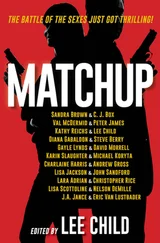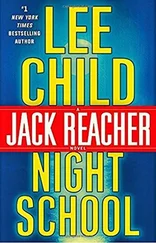Probably , he thought.
He raised his head again. The cabin windows were misted with dew. Dark and gray and featureless. Like television screens, turned off. Nothing was happening outside. Noises were dulled. Clearly the carpet and the quilting doubled as soundproofing layers.
He waited.
Five minutes.
Ten.
Then the misted windows lit up with bright moving shapes and shadows. The cars, coming back. Three sets of headlight beams, bouncing and turning. They played on the glass for a moment and then they stopped and stabilized. Then they died altogether. The cars, back in the lot. Parked.
Reacher strained to hear.
He heard nothing except slow footsteps and low voices. Agitation, not triumph. The unmistakable sound of failure.
The search was over.
No success.
He waited.
He waited and grew cold and cramped from sitting still. He pictured the scene forty yards away, Mauney’s body in the doorway, the empty Samsonite in the office, discussion, argument, pacing, panic, confusion, apprehension. The side of his face was inches from the seat back in front of him. The leather was close enough to smell. Normally he would have been in severe distress. He hated confinement. Claustrophobia was as close as he ever came to fear. But right then he had other things on his mind.
He waited.
Twenty long minutes.
Then a door opened up front and the helicopter dipped and settled as its undercarriage compressed and recovered. Someone had climbed aboard. The door closed. A seat creaked. A harness buckle clicked. Switches clicked. Faint orange light jumped from dozens of instrument faces and threw sudden shadows on the roof. A fuel pump whirred and chattered. Reacher leaned forward from the waist and moved his head until one eye was lined up with the gap between the seats. He saw the pilot’s leather sleeve. Nothing more. The rest of the guy was invisible behind his bulky chair. His hand was dancing over switches and touching the faces of dials one by one as he ran through preflight checks. He was talking to himself, quietly, reciting a long list of required technicalities like an incantation.
Reacher pulled his head back.
Then there was an incredibly loud noise.
It was halfway between a gunshot and a split-second blast of compressed air. It came again, and again, and again, faster and faster. The starter mechanism, forcing the rotor around. The floor shook. Then the engines fired up and gears meshed and the rotor caught and settled to a lazy whop-whop idle. The torque rocked and twisted the whole craft on its struts, just a little, rhythmically, like it was dancing. The interior was filled with a loud thrumming noise. Driveshafts whirred and spun overhead. Jet exhaust whined outside, high-pitched and piercing. Reacher jammed the muzzles of the captured SIGs under his legs so that they wouldn’t bounce and rattle and slide. He took his Glock from his pocket and held it down by his side.
He waited.
A minute later the rear door was wrenched open. A blast of louder noise flooded in. After the noise came the acrid smell of kerosene. After the kerosene came Karla Dixon. Reacher moved his head an inch and saw her dumped on the floor head first like a log. She came to rest on her side, facing away. Her wrists and ankles were tied with rough sisal rope. Her hands were behind her back. The last time he had seen her horizontal had been in his bed in Vegas.
Two minutes later O’Donnell was wrestled in, feet-first. He was bigger and heavier and landed harder. He was tied up the same way as Dixon. He rolled facedown alongside her, his feet next to her head. They lay there together like cordwood, moving a little, struggling against the ropes.
Then the struts bounced again and Lennox and Parker climbed aboard. They shut their doors and dumped themselves down in the rear seats. The seat back in front of Reacher sagged against a loose mechanism and touched him on the cheek. He jammed his head harder into the corner. His crew cut scraped across the carpet.
The rotor turned slowly, whop, whop, whop .
The suspension knelt and rose, knelt and rose, front left corner, right rear corner, less than an inch, like dancing.
Reacher waited.
Then the door up front opposite the pilot wrenched open and Allen Lamaison dumped himself in the seat and said, “Go.” Reacher heard the turbines spin up and felt the thrill and shiver of vibration fill the cabin and heard the rotor note change to an urgent accelerating whip-whip-whip and felt the whole craft go light on its wheels.
Then they were airborne.
Reacher felt the floor come up at him. He heard the wheels pull upward into their wells. He felt rotation and drift and a long steady climb and then the floor tilted forward as the nose went down for speed. He braced himself against spread fingers to stop himself sliding into the seat in front of him. He heard the engine noise settle to a muted whine and then the unique pendulum sensation of helicopter transport came right back at him. He had done his fair share of fast miles in rotary aircraft, a lot of them sitting on the floor.
A familiar experience.
For now.
By the clock in Reacher’s head the cruise lasted exactly twenty minutes, which was about what he was expecting. He had figured modern corporate machines would be a little faster than the Hueys he had been accustomed to in the service. He figured a military AH-1 might have taken twenty-plus minutes to get itself beyond the mountains, so twenty dead seemed reasonable for something with black leather seats and a carpet.
He spent the twenty minutes with his head well down. Animal instinct, a million years old and still displayed by dogs and children: If I can’t see them, they can’t see me . He kept his arms and legs moving through silent fractions of an inch and kept his muscles tensing and relaxing in a bizarre miniaturized version of a gymnasium work-out. He was no longer cold, but he didn’t want to get any stiffer. The noise in the cabin was loud but not overwhelming. The engine whine was whipping away in the slipstream. The rotor noise was blending with the rush of air and could be tuned out. There was no conversation going on. No talking. Reacher heard nothing from anyone.
Until the twenty-minute cruise came to an end.
He felt the helicopter slow down. Felt the floor come level and then tip backward a couple of degrees as the nose flared upward. The craft rotated left a little. Like a horse reined in on a movie screen. The cabin got louder. Now they were moving slowly, trapped in a bubble of their own noise.
He bent forward from the waist and put an eye to the gap between the seats and saw Lamaison leaning over with his forehead pressed against his window. Saw him change direction and lean toward the pilot. Heard him speak. Or maybe he only imagined that he heard him speak. He had reconstructed the orders in his head a thousand times since opening Franz’s file days before. He felt that he knew them, word for word, in all their cruel inevitability.
“Where are we?” Lamaison asked, in Reacher’s mind, and maybe also in reality.
“The badlands,” the pilot said.
“What’s below us now?”
“Sand.”
“Height?”
“Three thousand feet.”
“What’s the air like up here?”
“Still. A few thermals, but no wind.”
“Safe?”
“Aeronautically.”
“So let’s do it.”
Reacher felt the helicopter come to a stationary hover. The engine note dropped down to a deeper key and the rotor thrashed loudly. The floor moved in tiny unstable circles, like a spinning top come to rest. Lamaison turned in his seat and nodded once to Parker and once to Lennox. Reacher heard the click of safety-harness catches and then the weight came up off the seats in front of him. Leather cushions inhaled and tired springs recovered and moved the seat backs a precious inch farther from his face. There was no light other than the orange glow from the cockpit. Parker was on the left and Lennox was on the right. They were both in strange half-crouches, knees bent and heads ducked because of limited headroom, feet apart for stability on the moving floor, arms thrust outward for balance. One of them was going to die easy and one of them was going to die hard.
Читать дальше












